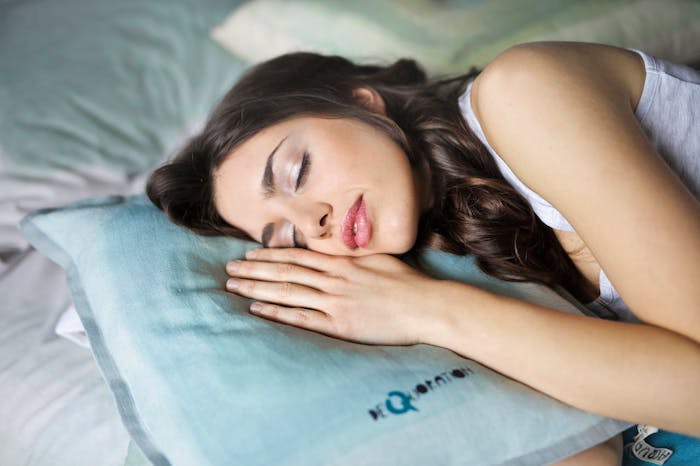Okay, be honest: how often do you sleep with makeup?
We all know what it feels like to want to crawl into bed after a long day. The last thing we want is to go through a lengthy skincare routine.
But before you crawl under the covers with a full face of makeup, let’s talk about why this isn’t the best idea for your skin.
Spoiler alert: it’s not just about the occasional outbreak.
Sleep with makeup: what happens to your skin?
Picture this: your skin, covered in a layer of foundation, concealer and maybe some eye shadow, mascara and lipstick. You can imagine that leaving it on overnight is no problem, but your skin demands it.
While you’re getting those Z’s, your skin is hard at work repairing and renewing itself. It uses sleep as a time to recover from the various stresses during the day and to shed and regenerate its cells.
However, when it suffocates under a layer of makeup, this natural process is disrupted.
Clogged pores
One of the main problems with sleeping with makeup is clogged pores. Throughout the day, our skin collects dirt, oil, and environmental pollutants, which can get trapped under makeup. When left overnight, these impurities mix with makeup and sebum, leading to the dreaded clogged pores.
This can result in acne, blackheads and dullness as your skin struggles to breathe and regenerate.
Disturbed pH balance
In addition, makeup can disrupt the skin’s natural pH balance. Many cosmetic products, especially those with long-lasting formulas, contain chemicals and preservatives that can alter the skin’s acidity. This imbalance can weaken the skin’s protective barrier, making it more vulnerable to irritation, inflammation and infection.
Drought
Your makeup may feel fresh when you first apply it, but think about how it feels throughout the day. Have you noticed any tightness? Itch? Irritation?
That’s because makeup sucks moisture from the skin over time. The ingredients in your mascara and eyeshadow can also separate and dry out, leaving your skin uncomfortable at best.
Leave all that makeup on overnight and chances are you’ll wake up with skin that looks dry, dull and not fresh. This will also make any fine lines or wrinkles more noticeable.
Photo by Ron Lach via Pexels.
Pollution
In today’s urban environment, pollution is a major concern for skin health. From exhaust fumes to industrial emissions, our skin is constantly bombarded with airborne pollutants that can wreak havoc on its delicate balance.
These particles, including heavy metals, polycyclic aromatic hydrocarbons (PAHs) and particulate matter (PM), can deposit on the skin’s surface throughout the day.
If left overnight, these pollutants can penetrate the skin barrier and cause oxidative stress, inflammation and DNA damage. This can lead to a range of skin problems, including premature aging, hyperpigmentation and a compromised skin barrier. Additionally, pollution has been linked to an increase in the severity of acne and a decrease in the skin’s natural ability to repair itself.
Eye effects
Leaving eye makeup on overnight can clog the tiny hair follicles and oil glands around the eyes, leading to inflammation and irritation. This can manifest as redness, itching and even swollen eyelids the next morning, making you look tired and puffy.
Additionally, mascara and eyeliner residue can flake off and get into your eyes while you sleep, causing discomfort and possibly causing eye infections or styrene.
The skin around the eyes is thinner and more fragile than the rest of your face, making it more susceptible to damage. Sleeping with eye makeup can worsen this vulnerability, leading to premature aging symptoms such as fine lines, wrinkles and sagging skin.
Over time, the repeated friction and irritation from applying makeup at night can contribute to the breakdown of collagen and elastin fibers, causing crow’s feet and bags under the eyes to appear more quickly. So if you want to look fresh and youthful, it’s essential to give your eyes the care and attention they deserve by removing makeup before hitting the hay.
Sleep in makeup: the price of convenience
Skipping your nighttime skincare routine every now and then probably won’t have any serious consequences. However, if you continually neglect to cleanse your skin before going to bed, it can lead to accelerated aging.
That’s because prolonged exposure to makeup, especially at night, can repeatedly expose your skin to all of the problems mentioned above, including dryness, pH imbalance, and free radical damage. Over time, this can result in more visible fine lines, wrinkles and sagging skin, prematurely aging your complexion.
Additionally, sleeping with makeup can worsen existing skin conditions, such as acne and rosacea. The combination of occlusive ingredients in makeup and the build-up of bacteria on the skin’s surface creates an ideal environment for inflammation and flare-ups. This can lead to persistent redness, swelling and irritation.

Don’t sleep with makeup: the importance of a nighttime routine
Prioritize your skin health by adopting a consistent nighttime skincare routine. If you’re too tired, we have some tips for that below. But usually try to do the following steps before going to bed.
1. Clean gently
Start by removing makeup and impurities with a cleansing oil, makeup remover, or micellar water. Then use a gentle cleanser to deeply cleanse your pores and leave your skin feeling refreshed.
If your skin is acne-prone, try a purifying cleanser. If it tends to be dry, choose a creamy cleanser. Either way, avoid alcohol and fragrances and ask yourself how your skin feels afterwards. If it feels tight, you need more moisture in your cleanser. Your skin should feel soft and smooth.
Whatever skin type you have, it is also useful to use a skin brush when cleansing. For sensitive skin, use a silicone facial device that is gentler on the skin. Both help remove all the dirt and grime from your pores.
2. Tone
Restore your skin’s pH balance and prepare it for the next steps by applying a toner. Look for alcohol-free formulas packed with moisturizing and soothing ingredients. We recommend our Rescue + Relief Spray as it is hydrating and anti-inflammatory and forms the base for your nightly moisturizer.
3. Treat
Treat specific skin care concerns, such as acne or aging, with targeted treatments. Use products that contain ingredients such as retinol, hyaluronic acid or vitamin C to promote cell turnover, boost hydration and fight free radical damage.
4. Hydrate
Retain moisture and nourishment by applying a rich, hydrating moisturizer appropriate for your skin type. Opt for non-comedogenic formulas that won’t clog pores or worsen acne. Try our Calming Moisture for long-lasting, deep-penetrating moisture that soothes redness and repairs the skin barrier so you wake up to smooth, radiant skin.
When you’re exhausted
If you’re thinking about going straight to bed without your nighttime skincare routine, don’t! Maybe you can start earlier if you get too tired later.
If you’re too tired to follow your usual routine, try doing at least two steps:
- Use a cleansing balm or oil. Apply and rub all over face, neck and eyelashes. Then remove with a facial tissue or cotton pad to wipe away excess product, impurities, dirt and makeup.
- Follow with our Rescue & Relief Spray. It offers a multitude of benefits in one, such as moisturizing and soothing, while helping to balance the skin barrier. The soothing aloe base helps soothe the skin. Other healing ingredients will promote regeneration overnight. Because it does not clog, it does not cause breakouts.
Leave a soothing liquid by your bed and rub it on before your head hits the pillow!
Don’t sleep with makeup: make it a habit!
Sleeping with makeup may seem harmless in the moment, but it can have long-term detrimental effects on the health and appearance of your skin.
By taking a few extra minutes to cleanse and care for your skin, you can protect yourself from acne, premature aging and other skin problems. The best approach is to make it a habit. Do it every night before going to bed. That makes it harder to avoid it, even on those nights when you’re very tired.
Remember, your skin deserves some TLC, so treat it right and say goodbye to sleeping with makeup for good!
Do you ever sleep with makeup?
Featured image by Andrea Piacquadio via Pexels.






